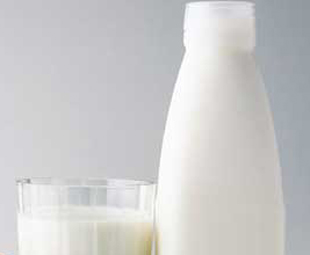At last it is time for your coffee break, and you decide on an extra large cup of cafe au lait for a change. There are ominous rumblings in your gut soon afterwards. Your abdomen bloats. You have gas.
Between 15 and 25 percent of northern Europeans suffer from lactose intolerance, i.e. trouble digesting the sugar found in milk and other dairy products.
"The diagnosis arouses fear in many people, but it's something you can live with fairly easily," notes Anja Baustian from the Aachen-based Society for Nutritional Therapy and Prevention.
Lactose intolerance is caused by a deficiency of the lactase enzyme in the lining of the small intestine, which breaks down lactose.
"If this enzyme is deficient, microorganisms have to help break down the lactose. The result is gas and a bloated abdomen," Baustian says. The deficiency can be hereditary or the consequence of gastrointestinal ailments such as celiac disease, Crohn's disease, or a bacterial infection.
Hereditary lactose intolerance is seldom conspicuous in infancy.
"It usually appears later, often after puberty," explains Professor Juergen Stein, a gastroenterologist from Frankfurt. Declining lactase production with age is normal in healthy people too, so lactose intolerance and the discomfort associated with it occur gradually.
"Some patients who have trouble digesting lactose aren't aware of it, and avoid dairy products intuitively," Stein says.
Lactose intolerance is nearly universal in parts of Africa and in China. The condition is irreversible.
"When you've got it, you've got it," Stein remarks - unless, that is, the cause is an intestinal disease. "In that case lactase production can resume once the disease has been completely cured," points out Sonja Laemmel, a food economist with the Moenchengladbach-based German Allergy and Asthma Association.
Laemmel says it is essential to consult a nutritionist, if you suspect you are lactose intolerant.
"The consultation should determine how much lactose, and which foods, you can tolerate," she says, adding that toleration levels depended in part on overall diet. "Whether you tend to eat more carbohydrates or more protein can make a difference."
The greater the degree to which a dairy product is processed, the less lactose it contains. "Fresh milk has a lot of lactose, yoghurt less, cheese even less, and butter hardly any at all," Laemmel notes. That is why hard cheese and butter are usually well-tolerated.
If you avoid dairy products, you must make sure to get sufficient calcium from other sources.
"Vegetables provide calcium. There's also mineral water that contains calcium. If need be, you can also take calcium tablets," Baustian says.
Rather than ridding your diet of dairy products, you can consume those with reduced lactose. Low-lactose milk and cream, and lactose-free yoghurt and cottage cheese make life easier.
"The food industry goes to extremes in some areas: It makes low-lactose butter and cheese, which contain little lactose anyway," Laemmel says.
Food labeling generally distinguishes among lactose-free, very low-lactose, and low-lactose products. Lactose-free means less than 10 milligrams per 100 grams; very low-lactose, less than 100 milligrams; and low-lactose, less than 1,000 milligrams.
"For the time being, this classification scheme is merely recommended. There are still no legally defined limits for the categories," says Norbert Pahne from the Bonn-based Diet Association.
If you don't want to abstain from dairy products, you can get lactase enzymes in dietary supplements available everywhere, Laemmel says. They are relatively expensive, however.
"If you're invited to a restaurant and don't know exactly how much lactose is in the food, a supplement can be quite useful," Baustian remarks.
But you should try it at home first to see if you can tolerate it.
(China Daily December 26, 2007)


